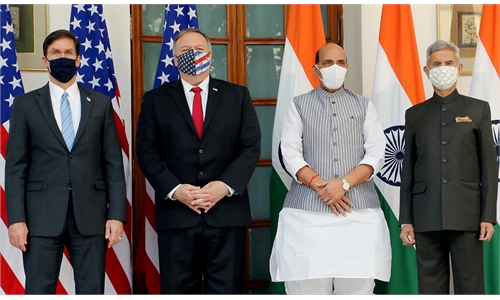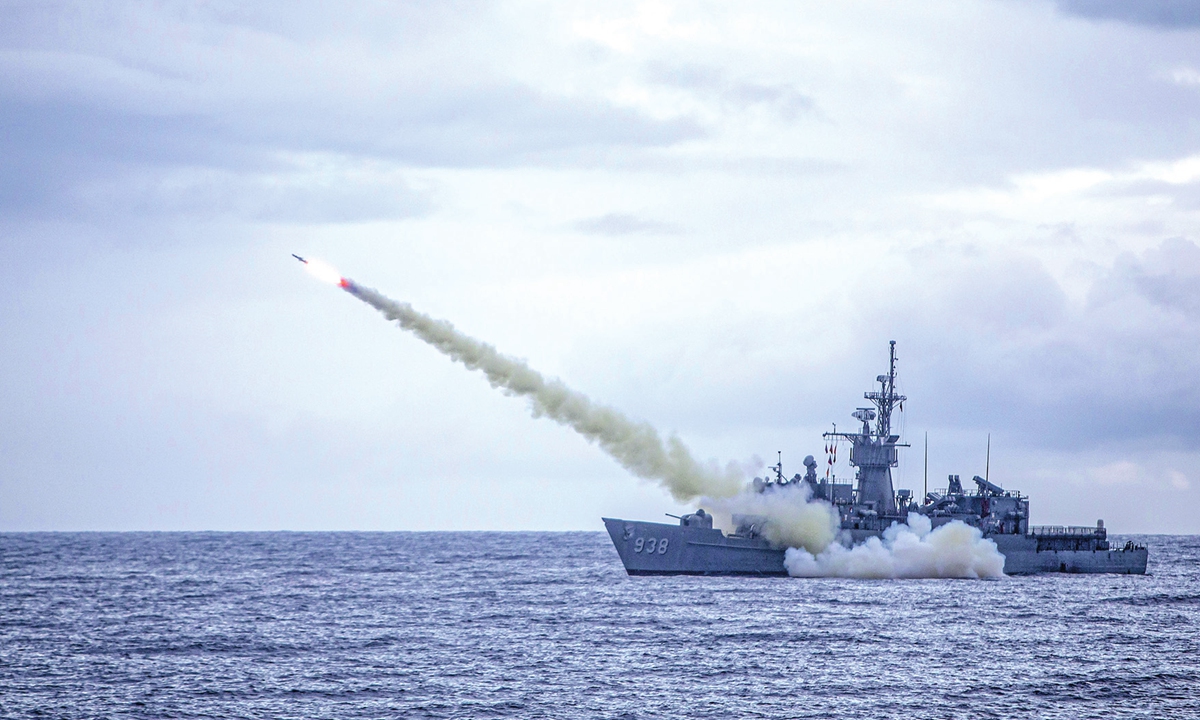
A Taiwan warship launches a US-made Harpoon missile during the annual "Han Kuang" military drill on July 15, 2020. Photo: AFP
The US has decided to sell 100 Harpoon Coast Defense Systems to the island of Taiwan for $2.37 billion, a deal that Taiwan authorities have welcomed and appreciated, according to Western media reports. It is reportedly the fourth of seven arms sales that Washington announced in September, and the second to have been approved in a week.
US arms sales to Taiwan have broken some previous restrictions under the Trump administration, becoming significantly more aggressive with an increase in the attack capability of the weapons. It appears that the country aims to gradually eliminate the taboo of selling defensive weapons to Taiwan by doing so. In the past, the US refrained on aggressive arms sales to Taiwan, except for the deal that the George H. W. Bush administration made in 1992 when the US sold 150 F-16 fighter jets to the island.
With the intention of using the "Taiwan card" to undermine China's development strengthens, the US is now seeing arms sales to Taiwan as a favorite trick of straight flush as it not only plays up the island's increased dependence on it and hope of "Taiwan secessionists" on the US over security, but also provokes the Chinese mainland. Washington has put itself on a position of being both player and banker in the risky game across the Taiwan Straits.
However, the increasing strength provides the Chinese mainland with a theoretically higher control of the situation. We should have the courage and wisdom to activate this capability, create leverage to exert strong influence and limit US arms sales to the island, and gradually seize the initiative in the game.
First, we should make an objective and firm judgment on the comparison of military strength across the Taiwan Straits - that is to say, the military strength of the mainland have formed an overwhelming advantage over Taiwan, which cannot be changed by US arms sales to Taiwan.
This gives us the strategic advantage to resolve the issue of US arms sales to Taiwan once and for all. We have the initiative in hand to decide how to eliminate this problem - on how long, at what intensity, and at what cost.
The momentum of US arms sales to Taiwan must be checked to fight the arrogance of "Taiwan secessionists." The sales have become the most substantial link between the US and the island of Taiwan, from which more interest chains and space for collusion can derive. We should not be indifferent to the sales despite our stronger military power over the island. Preventing US arms sales to the island from upgrading should become one of the main battlefields for the next cross-Straits struggle.
In the interest chain of US arms sales to Taiwan, the weak part is the Taiwan authorities and relevant US enterprises and interest groups. China in the next step should carefully investigate the institutions and individuals that have played a role in the US arms sales to Taiwan, and step up sanctions on them, making them pay the price.
We must make it clear to Taiwan authorities that purchasing weapons, especially offensive ones on a large scale, from the US will never be accepted by the Chinese mainland. The mainland will therefore take punitive measures, just like military actions as a warning if higher-level US officials visit Taiwan. As a result, Taiwan's purchase of US arms will be of no help in deterring the mainland, but the process itself is highly risky. The more US weapons the island buys, the more insecure it will become.
The mainland's punitive measures will, first of all, include making it routine to fly military aircraft across the so-called middle line of the Taiwan Straits. The mainland can also dispatch its jets over the island of Taiwan, normalize aircraft patrols approaching the island, and launch economic blockade against the island.
If these still cannot curb the military collusion between the US and the island of Taiwan, the mainland can resort to the ultimate warning - the People's Liberation Army would destroy the US offensive weapons Taiwan newly deploys. If Taiwan authorities refuse to be restrained, the mainland will end the dirty arms trade between the US and the island with a crisis. When there is a severe clash between the US, the Chinese mainland and the island of Taiwan, Taiwan authorities must be crushed first.
The long-term peace in the Taiwan Straits has emboldened Taiwan secessionists. The strength of the mainland is growing, while the "Taiwan secession" has come to a dead end. However, the Democratic Progressive Party authorities are becoming increasingly unbridled, thinking they have gained more support from the US. They misjudge the situation. The mainland must exert unprecedented pressure on the island to curb the evil trend.
The spirit of CPV soldiers resisting US aggression in Korean War inspires generations of Chinese people
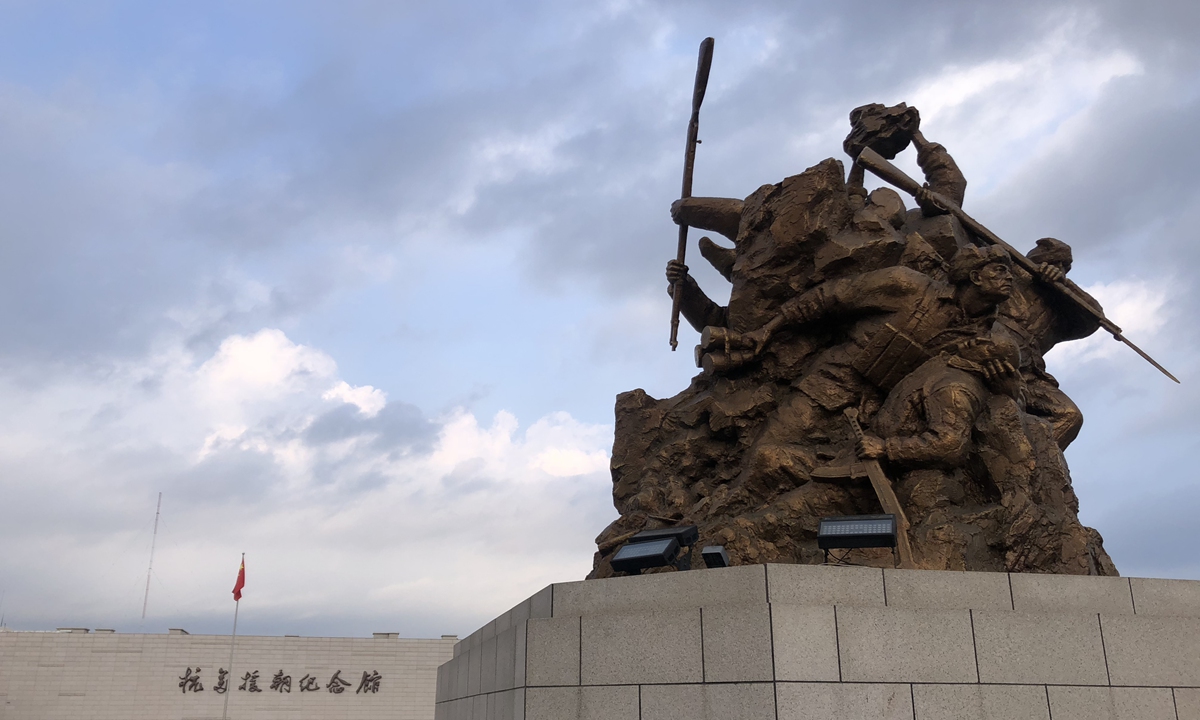
The Memorial Hall of the War to Resist US Aggression and Aid Korea in Dandong, Northeast China's Liaoning Province Photo: Li Qiao/GT
Visitors hum the nationally renowned anthem of the CPV army. "This song and the heroic deeds of CPV soldiers were with us growing up," a visitor in her seventies, with a Chinese national flag sticker on her face, told the Global Times.
October 25 was the CPV army's first fighting day of the war, exactly 70 years ago in 1950. Seventy years have passed and more CPV soldiers have left us in recent years. It may be difficult for the next generation to hear their stories in person. However, the CPV army's sacrifice of resisting US aggression, aiding Korea and defending national security is not forgotten, and their heroism is inspiring generations of Chinese committed to serving their country.
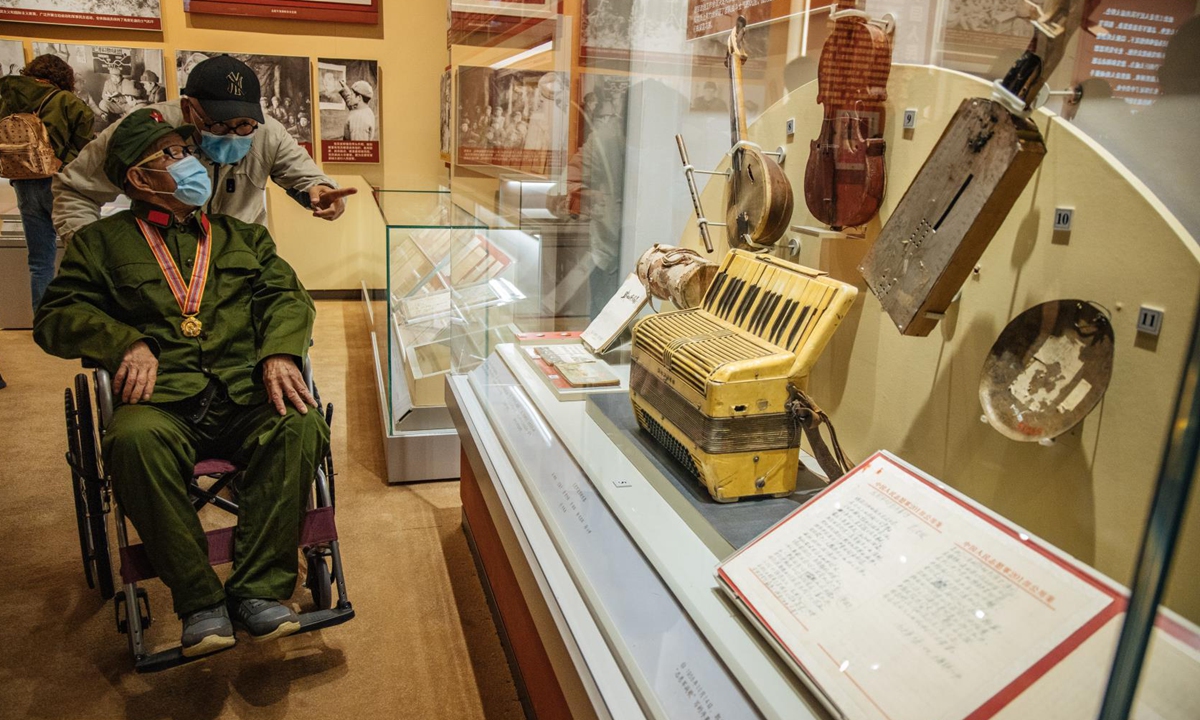
CPV soldier Han Tingfu, 94, is wheeled on a visit to the exhibition of the War to Resist US Aggression and Aid Korea in the Military Museum of the Chinese People's Revolution in Beijing on Sunday. Photo: Li Hao/GT
Heroes not forgotten
More than 29 million CPV soldiers participated in the War to Resist US Aggression and Aid Korea, with 197,653 soldiers confirmed as martyrs by China's Civil Affairs Ministry. Many of the surviving soldiers are in their nineties. For some veterans, it might be difficult to visit the memorial hall or other historical sites of the war in Dandong. But people related to CPV soldiers and who experienced that period of history still commemorate their legacy in various ways.
"Inspired by the CPV soldiers I admire most, I became a radar operator in Air Force when I grew up," He Shufang, an 84-year-old visitor from Fencheng city, Northeast China's Liaoning Province, told the Global Times.
While looking at a CPV exhibit in the memorial hall, He sang "Heroic Auto Driver," a song about the War to Resist US Aggression and Aid Korea. "It was a CPV soldier who taught me this song when we lived together. My biggest regret was seeing them go to the battlefield but not seeing them come back," He said.
Fengcheng is only 73 kilometers away from Dandong. Seventy years ago, his family lent a room to CPV soldiers. Half of his school building was lent to CPV soldiers.
"Even though we were far behind the US in terms of weaponry, I felt that our CPV soldiers were still full of courage to rush to the battlefield to defeat US aggressors under difficult conditions. The days living with them inspired me to join the army and defend our country later," He said.
He said he would enlist in the army again if he could and expects young people to work hard and love their country. "We Chinese love peace and don't want to get involved in wars but we are not afraid of wars if there are aggressions," He noted.
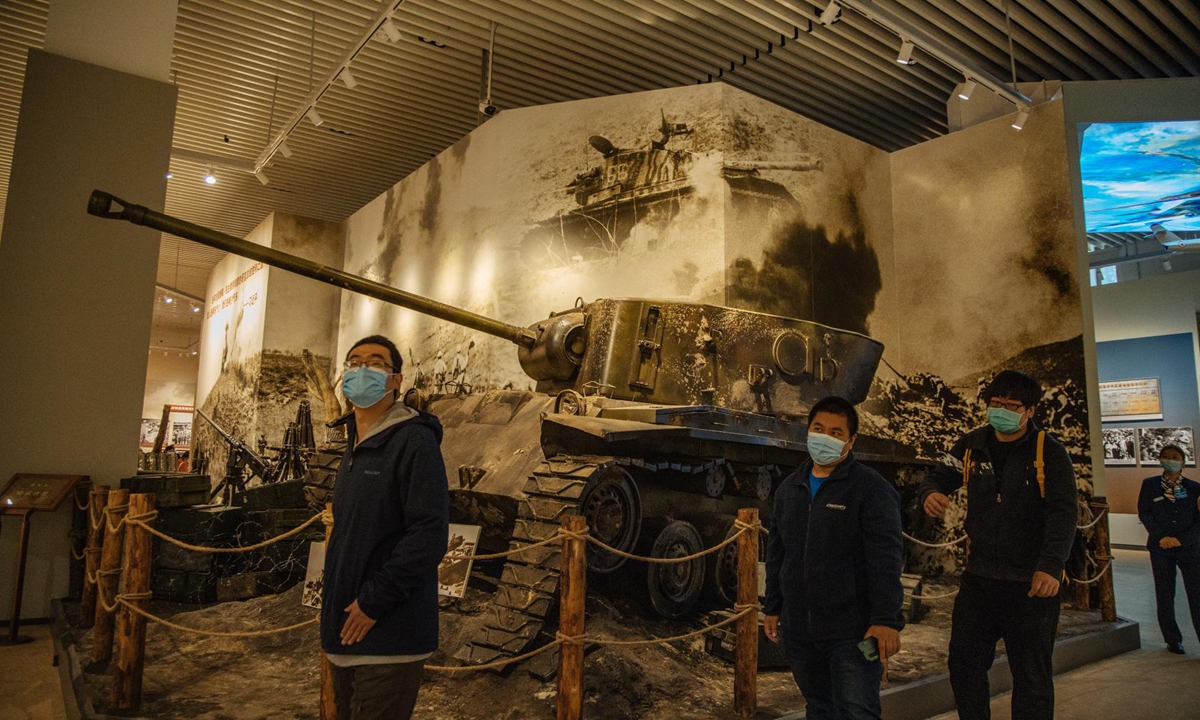
Visitors tour the Military Museum of the Chinese People's Revolution in Beijing on the first day of a special exhibition marking the 70th anniversary of the CPV army's participation in the War to Resist US Aggression and Aid Korea on Sunday. Photo: Li Hao/GT
There are also many relatives of CPV soldiers who visited the memorial hall in memory of their loved ones.
"I came to visit the memorial hall for the sake of my brother who passed away two years ago," said Xiao Yumei, a 75-year-old woman from Dalian, a four-hour's drive away from Dandong.
Her older brother, Xiao Peiyuan, was a CPV soldier who was transferred back home after losing a toe on his left foot during the war. The soldiers who fought with him all died in combat.
"Looking at the mock scene of the war, it's as if my brother is one of the unnamed heroes here on display. If only my brother could come see it and celebrate the 70th anniversary with us." Xiao said.
Xiao noted the living should appreciate heroes who sacrificed their lives for the safety of a neighboring country and the motherland, and that the living should follow in their footsteps of history.
Zhang Fasong, 90, traveled 1,223 kilometers from Hegang, Northeast China's Heilongjiang Province to observe the war's 70th anniversary in Dandong. He described this trip as his dream journey.
Seventy years ago, Zhang failed to join the CPV army because he was two centimeters short of the height requirement.
Standing on the Yalu River Broken Bridge watching North Korea on the other side, Zhang told the Global Times that, "I'm 90 and I don't know how long I'll live. Before I die, I just want to see the Yalu River and tell the CPV soldiers who crossed the river 70 years ago that China is today prosperous and we are enjoying a peaceful and happy life now."
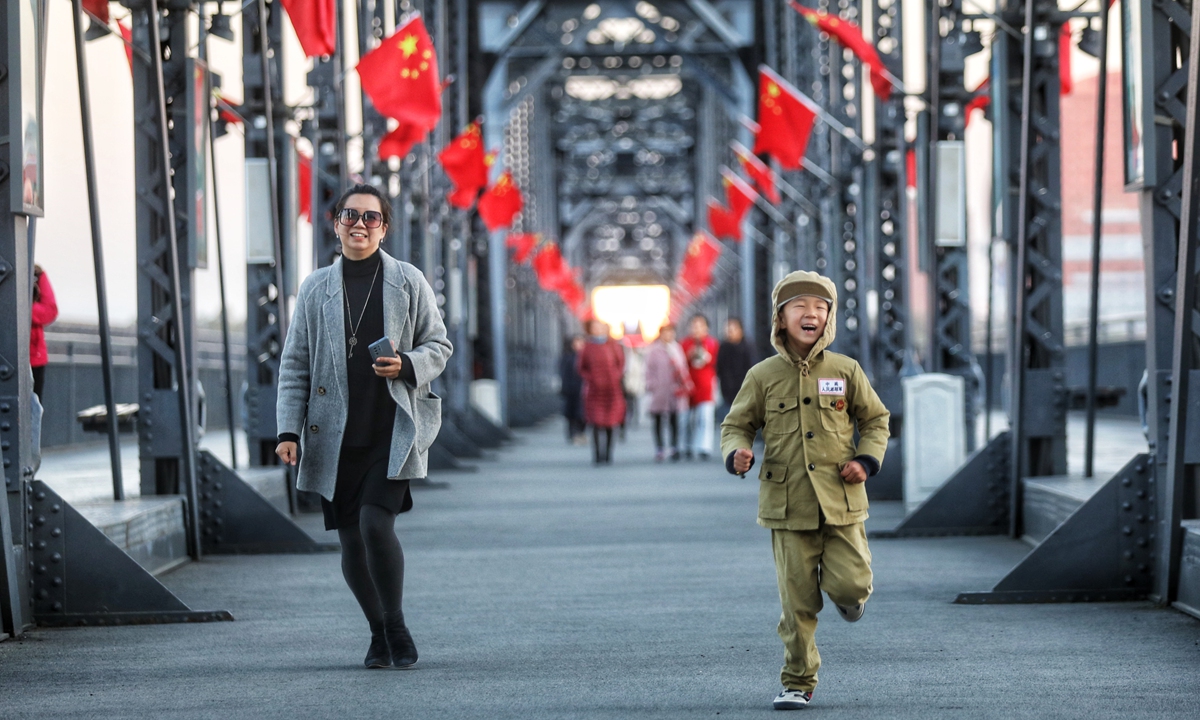
Six-year-old Huhu, dressed in CPV army clothing, commemorates the War to Resist US Aggression and Aid Korea, which his great-grandfather had participated in, on the Yalu River Broken Bridge in Dandong on Friday. Photo: Cui Meng/GT
Inheriting the spirit
Many young Chinese only learn about the history from textbooks and have little personal connection with the war. Some of them specifically come to Dandong to learn about this history, saying they are touched and inspired by the spirit of the CPV after learning of their heroism.
Zhang Yating, 32, expects to completely learn about the war history in Dandong. She is a nurse from Beijing who battled on the anti-epidemic front line earlier this year. She was honored as one of "the most admirable people in the new era."
Zhang was responsible for conducting nucleic acid tests.
"It was a very difficult time being wrapped in protective clothing every day and not being able to see my children and parents for safety reasons. However, compared with dangers which CPV soldiers suffered from, the difficulties which I experienced for anti-epidemic work were nothing," Zhang said after visiting the memorial hall.
Zhang said she was disappointed by US smears toward China's anti-epidemic work. "Our CPV heroes defeated US aggression 70 years ago. Our medical staff, inheriting their heroic spirit, struck down US slander by effectively controlling COVID-19," Zhang noted.
During Qingming Festival, Mid-autumn Festival and other national holidays, people from all over the country come to sweep tombs for CPV martyrs, Sun Dali, the director of the Dandong Cemetery of the War to Resist US Aggression and Aid Korea Martyrs, told the Global Times.
Because of anti-epidemic measures, the cemetery held an online memorial service for the Qingming Festival in April. A CPV martyr's relative in the epidemic's most affected city, Wuhan, Central China's Hubei Province, was quarantined at home and burst into tears seeing the tombstone online, Sun said.
China introduced the Heroes and Martyrs Protection Law in 2018, which protects the reputation of heroes and promotes commemoration of their legacy.
"The nation and society have paid more and more attention to the CPV martyrs in recent years. The young generation will inherit the spirit of our heroes," Sun said.

